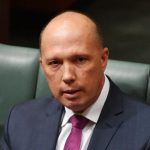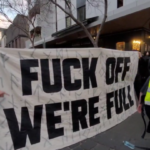Hillsong Church Admits Founder’s ‘Indiscretions’

Hillsong Church has admitted to a global staff meeting that its founder Brian Houston made ‘indiscretions’ against two women.
The announcement was made by the current head of the organisation, Phil Dooley, at an extraordinary meeting of 800 global staff members earlier this year.
The ‘indiscretions’
The first incident occurred some years ago and involved an inappropriate text message sent to a female staff member. She made a formal complaint against Mr Houston and left the church shortly thereafter. She was paid a financial settlement equivalent to ‘a couple of months’ salary’ as a result.
A second complaint involved Mr Houston spending 40 minutes in a woman’s hotel room after a Hillsong conference in Sydney that was attended by Prime Minister Scott Morrison, who is a long-time friend of Houston.
Pastor Dooley explained that Mr Houston was under the influence of alcohol as well as on anxiety and sleeping medication at the time. He added that the woman had also been drinking and asserted that her recollection of events was not “completely coherent.” After the event, the woman’s conference fee and a donation she had made were both refunded.
Pastor Dooley has denied that the church tried to “cover up” these incidents, saying it’s important that everyone who attends the church must feel safe and not subjected to “any form of abuse or harassment”.
Concealing child abuse
In both cases, Mr Houston personally paid the women’s expenses because they were “his fault.”
He was stood down from his role within earlier this year to deal with criminal charges of concealing child sexual abuse, which carry a maximum penalty of 2 years in prison.
The offence is contained in section 316A of the Crimes Act 1900 (NSW) and requires the prosecution to prove beyond reasonable doubt that the defendant:
- Was an adult,
- Knew, believed or ought reasonably have known that a child abuse offence had been committed,
- Knew, believed or ought reasonably have known that he or she had information which might be of material assistance to arrest, prosecute or convict the offender,
- Failed to bring the information to the attention of a NSW police officer as soon as practicable after it was obtained, and
- Had no reasonable excuse for your failure.
The definition of ‘child abuse offence’ covers a wide range of crimes against persons under 18, including:
- Serious assaults,
- Sexual offences such as sexual assault, sexual touching, sexual act, grooming, procuring, child abuse material and child prostitution, and
- Failing in parental responsibilities to care for a child, as well as abandoning or exposing a child.
‘Information.. [of] material assistance’ is not defined by the Act, and is a matter of fact to be determined by the court.
The defendant had a ‘reasonable excuse’ for not reporting the information to police if:
- He or she believed on reasonable grounds that police already had the information,
- He or she reported the information through other over legislative mechanisms such as those in the Children and Young Persons (Care and Protection) Act 1998, or the Children’s Guardian Act 2019, or Part 3A of the Ombudsman Act 1974 before it was repealed, or believed on reasonable grounds that another had reported it in that way,
- He or she had reasonable grounds to fear for the safety of any person if you were to report the information,
- He or she was under the age of 18 when you obtained the information
- The alleged victim was an adult at the time the information was obtained, and the defendant believed on reasonable grounds that he or she did not want it reported, or
- The information related to an assault at a school, and:
- It resulted in no more than a minor injury
- The parties were both school students under the age of 18 years
- The defendant was a member of staff at the school, and
- He or she took reasonable steps to report the information to
Defences to the charge include:
- Duress, and
- Self-defence, including the defence of another.
The subject abuse
The abuse in this case is alleged to have been perpetrated by his late father Frank Houston and is alleged to have occurred in the 1970s. It first came to light during the Royal Commission into Institutional Responses to Child Sexual Abuse.
Police allege Mr Houston knew from September 1999 that his father Frank Houston had indecently assaulted at least 9 young boys, as young as 7 years old in the 1970s.
Documents tendered to the court allege that Mr Houston failed to alert authorities, despite believing his father had committed the assault, and knowing he had information that might help a prosecution.
After “extensive” investigations, in 2019 detectives handed the brief to the Office of the Director of Public Prosecutions, who provided advice before Mr Houston was charged late last year. Brian Housten and his wife were in the US, despite The Australian border lockdown, his lawyer was served a court attendance notice.
Brian Houston has always maintained his innocence and is defending the charges. He has pleaded not guilty. The case is due back in court this month.
Sexual assault conviction
In recent years, the church has been plagued with allegations of immoral and illegal behaviour. In 2016 a visiting American student Anna Crenshaw was indecently assaulted by Jason John Mays, a Hillsong staff member at a mutual friend‘s home. Ms Crenshaw told the church about the assault in 2018.
Mr Mays pleaded guilty and was convicted of indecent assault in Penrith Local Court in January 2020, with no criminal conviction recorded. He has been allowed to remain on staff at the church, which has been justified by senior church members because “the Lord has forgiven him,” he made a stupid mistake, and deserved a second chance.
The decision to allow him to keep his position has been a controversial one, particularly amongst the Church’s younger followers who wrote to the church leaders to protest the decision, in light of the church’s strict policies on sexual abuse.
Ms Crenshaw has since left the church, disappointed with the way her complaint was handled, and angry over tweets made by Brian Houston as the story became public.
He shared on social media that she had been abused in her home church as a youth, and later had to apologise over backlash that he had used Ms Crenshaw’s past trauma to deflect responsibility and accountability for his own Church.
It’s not clear why the church leaders felt the need to disclose the incidents involving Brian Houston at an extraordinary meeting this week, although like most large organisations, when there has been misconduct, it’s often considered better to “control the narrative” and therefore mitigate any negative public perception.








